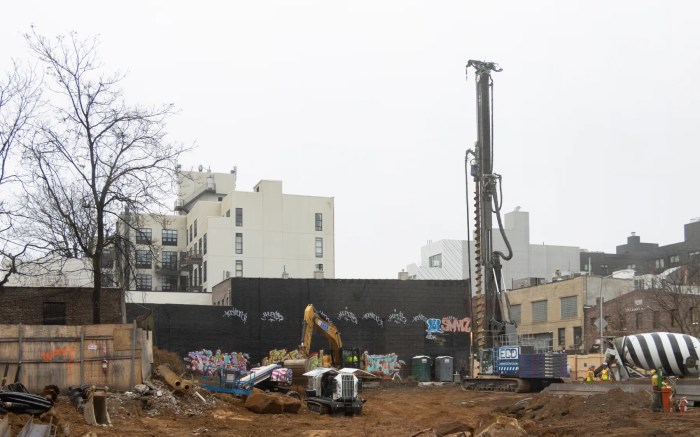By JERRY TALLMER
How young they all were! It’s almost Thornton Wilder’s extraordinary ambition — “to see through the two ends of the telescope at the same time” — come to pass before our eyes.
Paul Newman and Eva Marie Saint, 1955. William Holden and Martha Scott, 1940. Even boyish Spalding Gray, with only five years left on earth, so stupidly snooted by the deep thinkers for his straightforward, casual Stage Manager in the Lincoln Center production of “Our Town” in 1989.
Here then, one minute, is baby-faced Newman sharing a drugstore chocolate sundae with Eva Marie Saint in the 1955 musical version starring Frank Sinatra (!) as the Stage Manager. Here, a few minutes later, is senior-citizen Paul Newman, his glasses down over his nose, as the Stage Manager of an “Our Town” on the living stage 47 years later. The production, brought from Westport, Connecticut, to Broadway under the direction of James Naughton, will give Newman a reward he has never in all his life had before, not even, he says, as Chance Wayne in Tennessee Williams’s “Sweet Bird of Youth” — the dead silence (“not a whisper … not a cough … not anything”) of an audience wrapped out of its own soul and into the play.
All of the above people will outlive the Emily Webb of Grover’s Corners who marries at 17 and dies in childbirth — her second child — at 26. If “Our Town” is a play about … well, “Grover’s Corners, New Hampshire, United States of America, Continent of North America, Western Hemisphere, the Earth, the Solar System, the Universe, the Mind of God,” it is also about, as director Naughton puts it, “that kind of loss which we all — all — will know.”
In short, death.
Not for nothing is the Character Studies Special which gets aired on PBS this Sunday, July 22 (Channel 13, 12:30 p.m.) titled “Living and Dying in ‘Our Town.’” But far more than that constraint, into a single hour this many-faceted television palimpsest packs a whole time-slicing, time-binding anatomy lesson of the Wilder drama that itself saw birth — Broadway birth — in the 1938 Jed Harris production starring Frank Craven as the Stage Manager and an unknown Martha Scott as Emily.
We even catch a tiny glimpse of Jed Harris’s name in The New York Times’s ABC listing of the show, deep into the TV hour. I mean, the man wasn’t overmuch loved — Olivier patterned his spiderlike Richard III on Jed — but just that burial of Emily under a carpet of umbrellas on a bare-walled rain-swept stage, before her brief return to find how beautiful and how fleeting life had really been, is greatness enough for my money.
Life, one might add, in this America, the America we wished we thought we imagined we dreamed we believed we would like to believe we once knew, and still — somewhere in our musculature, our bones, our brains, our lymph glands — continue to want to know.
“The time is 1901,” says Eli Wallach (himself in his early 90s) opening the TV hour. “The place: America’s memory.” And then, lest anyone forget: “Silver linings only exist because of some very dark clouds.” Cynthia Nixon, another Emily, repeats the warning — as will Eric Stoltz, a George Gibbs — and later, in more contemporary tenor, Ms. Nixon reminds us that, of those two kids discovering themselves and their longings over the soda fountain, how far ahead in maturity is the girl, Emily, vis a vis the boy whom she’ll marry. (Indeed, one of the George Gibbses seen later in the hour seems to lack even gender, much less maturity.)
It’s not just the leading players who make the program worth watching but so many of the unforgotten faces and half-forgotten names of Fay Bainter and Beulah Bondi, for instance, snapping beans and trading secrets as Mrs. Gibbs, mother of Emily, and Mrs. Webb, mother of George; or Thomas Mitchell and Guy Kibbee as Dr. Gibbs and editor Webb; or Stuart Irwin as milkman Howie Newsome; or even George Burns as a rather unlikely Stage Manager.
Or Fay Bainter (again) saying to daughter Emily (my own favorite line of the whole play): “You are pretty enough for all normal purposes.” Speak of universal.
In between this human parade we get interleaves of snapshots, scrapbook pages, photo albums, news photos, engravings, headlines of an era, 1901-1913, when America believed in the “manifest destiny” of this land and its people; an era when, as Paul Newman reminds us, “time wasn’t as compressed as it is today” and a president named William McKinley could be assassinated without it making the slightest dent in Grover’s Corners. All of this researched material somehow here becomes, remarkably, part of the play itself.
I forget who in the documentary complains (just like a comic protester in the play) that “we never see or even hear about poor people” in Grover’s Corners, but that isn’t true either, because what about that Polish family on the wrong side of the railroad tracks, where Doc Gibbs spends all night delivering twins?
Finally we get, very briefly, Mr. Thornton Wilder himself, crisp looking, moustached, eyeglassed, almost military in bearing. He says nothing. He lets “Out Town” speak for itself. “He boiled everything down to the essences,” says James Naughton, and when you have the essences, you have … everything.
LIVING AND DYING IN “OUR TOWN.” A Character Studies presentation. Tony Vellela, writer and executive producer. Sunday, July 22, 12:30 p.m., PBS Channel 13.






































